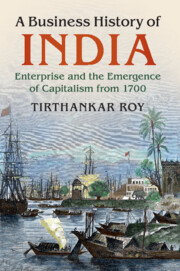Book contents
- A Business History of India
- A Business History of India
- Copyright page
- Dedication
- Contents
- Figures
- Maps
- Tables
- Boxes
- Preface
- 1 Introduction
- 2 The Baseline at 1700
- 3 The Indian Ocean Sphere: 1700–1850
- 4 Capital and Empire (1850–1930)
- 5 Capital and Empire (1850–1930)
- 6 State and Industrialisation: 1930–1950
- 7 State and Industrialisation: 1950–1980
- 8 Revival: 1980–2000
- 9 Capital and Globalisation: 2000–2015
- 10 Conclusion
- References
- Index
10 - Conclusion
Published online by Cambridge University Press: 20 March 2018
- A Business History of India
- A Business History of India
- Copyright page
- Dedication
- Contents
- Figures
- Maps
- Tables
- Boxes
- Preface
- 1 Introduction
- 2 The Baseline at 1700
- 3 The Indian Ocean Sphere: 1700–1850
- 4 Capital and Empire (1850–1930)
- 5 Capital and Empire (1850–1930)
- 6 State and Industrialisation: 1930–1950
- 7 State and Industrialisation: 1950–1980
- 8 Revival: 1980–2000
- 9 Capital and Globalisation: 2000–2015
- 10 Conclusion
- References
- Index
Summary
Why Write a Business History of Modern India?
The mood of the present shapes opinions about the past – perhaps nowhere is this effect stronger than in business history. In the bleak 1970s, western scholars attributed Indian poverty to the weakness of its entrepreneurship. The ‘immaturity’ of Indian capitalists, Marxist economists held, was an outcome of British colonial rule; though Karl Marx himself believed that, after the despotic Mughals who bullied merchants, the British would set capitalists free.
In the new millennium, resurgence of economic growth led to a different view of history, one that suggested that Indian entrepreneurship was always robust – only politics or external factors held it back. ‘The common belief,’ writes a team of eminent executives, entrepreneurs, and academics, ‘is that India has risen from nowhere a few years ago.’ History, the team goes on, proves this belief to be wrong. India was a great place for doing business in the distant past, but fell from grace thanks to ‘waves of invasion’. In the same spirit, India's emergence represents, for one author, the persistence of a ‘long tradition as buyers and sellers … Indians are very entrepreneurial’.
But the new mood cannot be trusted either, for India gets very bad scores on the Global Competitiveness Index, and the Ease of Doing Business Index. Key services from retail trade, to healthcare, hotels, print media, tourism, banking and finance, education and films, which together contribute about half of the gross domestic product (GDP), have grown in scale but not much improved in the quality that they deliver. India has the world's largest film industry, but its films do not win prizes in international competitions. India has one of the biggest university systems, but only a handful figure among the 500 best universities of the world. An HSBC index comparing the quality of expatriate lifestyle ranks India very low (20–30 among 34 countries) on healthcare, accommodation, utilities, finance, and ease of local travel. India is hardly the haven of capitalism that it is projected to be. If it is not now, perhaps it was not in the past either.
- Type
- Chapter
- Information
- A Business History of IndiaEnterprise and the Emergence of Capitalism from 1700, pp. 256 - 265Publisher: Cambridge University PressPrint publication year: 2018

